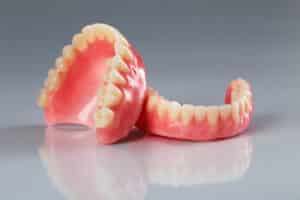
It’s common for elderly adults to get full dentures and while they will look and feel better overall, it can take some time to get used to them when they are new. Family caregivers and elder care providers should be careful about what foods they serve to an aging adult with new dentures. They can also work with them to minimize any discomfort and get the dentures to feel more natural.
Here are some tips for helping your senior loved one get used to brand new dentures.
Start with a Liquid Diet
For the first two or three days, seniors with new dentures should have a liquid diet because the gums will be very sensitive. Seniors that try to chew too soon can experience great discomfort and could even harm the gums. The best food choices include oatmeal, soup, applesauce, pudding, and smoothies.
Avoid Hot Liquids
Whether it’s coffee, tea, hot cocoa, soup or something similar, hot drinks can burn the mouth when people are getting used to dentures. Because there are no nerves that are exposed to the hot liquid at first, seniors may mistake the lack of pain for cooler temps. It’s best for them to take a small sip to test the temperature first.
Progress to Small, Soft Bites
After a few days, elderly adults with new dentures can eat soft food in small pieces. Seniors need some time to get used to the way their mouth works now, and small, soft food is ideal. Family caregivers and elder care providers should avoid giving elderly adults tough or chewy food, like steak, raw carrots, popcorn, nuts and taffy.
Stay Away from Sticky Food
One of the worst type food that elderly people with new dentures can eat is sticky food, like peanut butter, caramels and toffee. Not only can the food help dislodge dentures, it can get stuck up by the gum, causing irritation and discomfort.
Chew On Both Sides
Because learning to chew with dentures can take some time, elderly adults need to focus on using both sides of the mouth. If they only chew on one side, the dentures could displace easily. It’s a good idea for elder care providers to encourage aging adults to chew on both sides once they move from liquids to solid food. If there is pain in the gums that is constant or growing in severity, family caregivers and elder care providers need to schedule another visit for the elderly adult with the dentist.
With proper care, it won’t take long for elderly adults to start eating normally. In the meantime, family caregivers and elder care providers can do a lot to make them comfortable while preparing healthy meals and snacks.
If you or an aging loved one are considering elder care in Far West Houston, TX, please call the caring staff at At Your Side Home Care. We will answer all of your senior care questions. Call today: (832) 271-1600.
Our Certified Nurse Aides, 24-Hour Live-in Assistants and Home Health Aides are available 24 hours a day, 365 days a year. We also provide the security and confidence of 24-hour Telephone Assistance, so fast, reliable help is always available when it's needed. To learn more about our homecare services see our homecare services page.
Different people need different levels of homecare. To meet the requirements of our clients, At Your Side Homecare maintains consistent staffing levels of caring professionals. Homecare service is available for as little as a few hours a week, or as many as 24 hours a day, seven days a week
- 5 Signs a Senior Might Be in the Beginning Stages of Dementia - April 25, 2025
- What Solutions Can Help Seniors with Mental Health Challenges? - April 18, 2025
- How Does Senior Home Care Help Make Aging in Place Possible? - April 11, 2025



